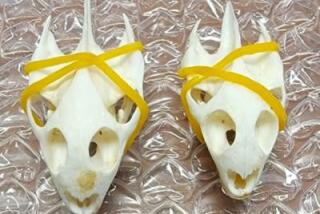Agency Tracks Wildlife Smugglers : Law enforcement: Traffic International follows trade of exotic species. It compiles data from customs officials and traders worldwide.
- Share via
PERTH, Australia — One of the world’s smallest law enforcement agencies, Traffic International, is leading the fight against illegal trade in protected wildlife.
While international law is painstakingly refined year after year, Traffic’s worldwide staff of 30 keeps track of daily dealings in such rare and exotic species as the Javan rhinoceros and the hyacinth macaw.
“You need a wide network of contacts, but we are involved in very little cloak-and-dagger stuff,” Traffic’s director Jorgen Thomsen said in an interview here.
“People in the wildlife trade are not all crooks. Good guys understand that when someone is caught trafficking in endangered species, they all get a bad reputation.”
Traffic International was set up in 1976, after the Convention on International Trade in Endangered Species (CITES) took effect. The name is short for Trade Record Analysis of Flora and Fauna in Commerce, and the organization is chiefly funded by the World Wide Fund for Nature.
From its headquarters in Cambridge, England, and offices in Australia, Belgium, France, Germany, Holland, Italy, Japan, the United States and Uruguay, it compiles data from customs officials and traders worldwide, and exchanges it with Interpol and the CITES secretariat in Switzerland.
“Suppose someone is caught trying to smuggle a Major Mitchell’s cockatoo from Australia to the United States,” said Debbie Callister, researcher in Traffic’s Sydney-based Oceania office.
“These are beautiful pink birds with a red and yellow crest; they are also among the most attractive for smugglers because they are hard to breed in captivity.
“They are listed under CITES Annex 2, which permits trading of certain species under license, but Australian law is stricter in this case than CITES and prohibits their export.
“We might compile price lists from U.S. aviculture journals to help the courts decide on a fine commensurate with the offense.”
“With rare species, it’s a seller’s market,” Callister went on, “but there is a surprising amount of public information. We follow up anything that looks suspicious--discrepancies in customs figures for instance.”
In a recent case, Thomsen said, Traffic enabled Taiwan customs officers to seize a consignment of 24 rhino horns after passing on information from police in South Africa.
All species of rhinoceros are listed under CITES Annex 1, which prohibits all trade in animal parts.
The CITES secretariat cannot operate, however, in Taiwan, which does not belong to the United Nations.
“They would have had to go through the CITES office in Beijing, and in this case that would have got them nowhere fast,” Thomsen said.
Despite the CITES listing, there is a market for rhino horn in Asia, where it is prized for its purported medicinal powers.
“More than 700 products derived from rhino horns are being traded on the open market in Hong Kong and other Asian cities,” Thomsen said. “But it is a Western myth that the horns are valued as aphrodisiacs.”
The horns are also sought in Yemen, where they are made into handles for the jambiya , a curved tribesman’s dagger.
South African police tipped off Traffic after arresting three Taiwanese and one South African in possession of 81 horns smuggled from Malawi and Swaziland.
While exotic animals catch the public’s eye, they may need less protection than more common species.
Amie Brautigam, deputy chairman of the trade specialist group for the IUCN-World Conservation Union, explained, “It is difficult to conceal the origin of a species like the hyacinth macaw, which is now virtually confined to Brazil.”
It is harder to track dealings in species such as the palm parrot, which is native to Australia, Indonesia and Papua New Guinea, she said.
“All three countries have an export ban on palm parrots, so an unscrupulous dealer trying to sell one abroad will say it was captive-bred and not exported,” Brautigam said.
More to Read
Sign up for Essential California
The most important California stories and recommendations in your inbox every morning.
You may occasionally receive promotional content from the Los Angeles Times.













